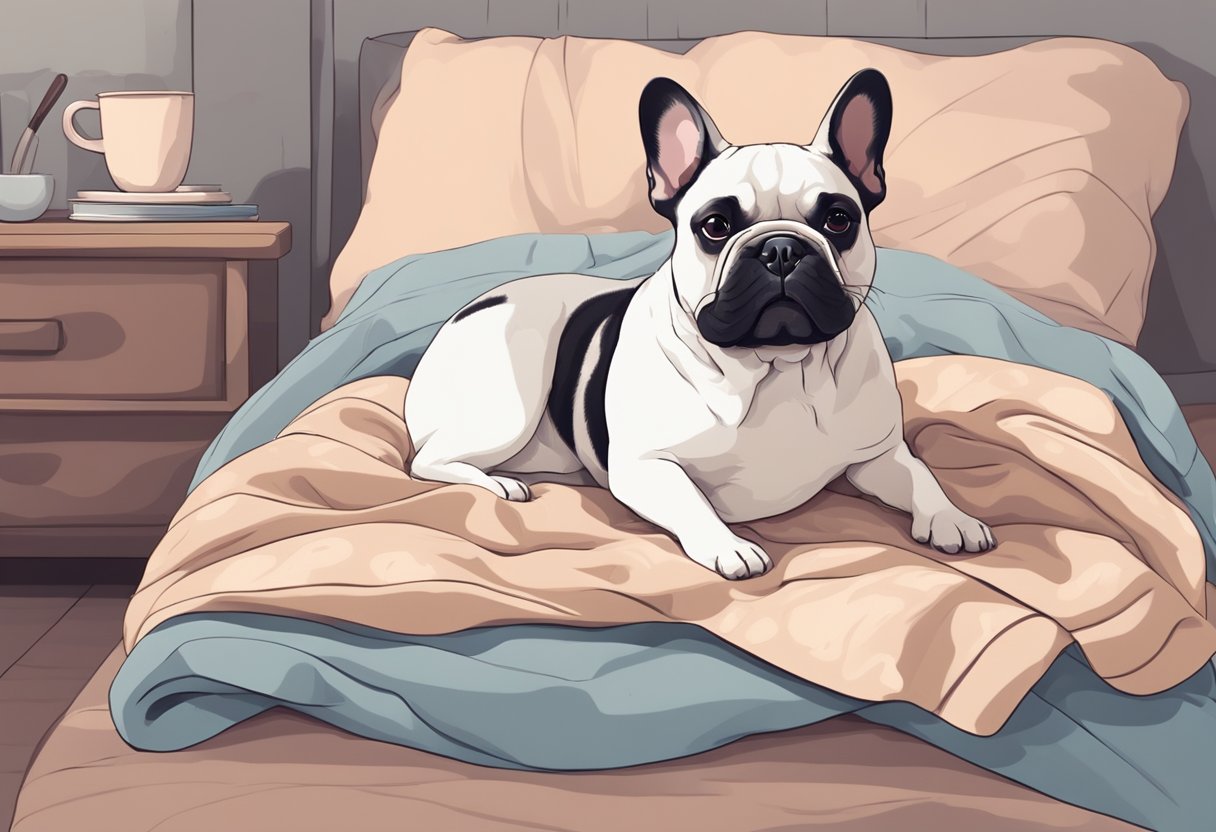French Bulldogs, a breed known for their distinctive bat ears and affectionate nature, have a unique and challenging process when it comes to giving birth. Their broad shoulders and large head present particular difficulties during the natural birthing process. As a result, veterinarians and breeders are often inclined to manage the delivery through a cesarean section to prevent complications for both the mother and her puppies. These birthing challenges are due to the deliberate breeding practices that have focused on the French Bulldog’s physical characteristics, often at the expense of their overall well-being.

Understanding the reproductive and pregnancy needs of French Bulldogs is essential for any prospective breeder or owner. Preparing for pregnancy involves regular veterinary checkups and understanding the signs of labor. Throughout the pregnancy journey, careful monitoring is crucial. When the time comes for delivery, knowing the signs of labor onset and when to seek immediate veterinary care can be lifesaving. This is particularly true with French Bulldogs, as they are at a higher risk for dystocia, a condition leading to difficult labor, which can result in emergency interventions.
Key Takeaways
- Cesarean section is commonly used for Frenchie births due to physical characteristics.
- Vigilant monitoring throughout a French Bulldog’s pregnancy is critical for health.
- Recognizing signs of labor and potential complications is essential for timely intervention.
Understanding French Bulldog Reproduction

French Bulldogs have distinctive reproduction characteristics, primarily due to their unique physical structure. Genetic factors strongly influence the breed’s ability to reproduce naturally. This is chiefly because French Bulldogs possess certain phenotypic traits—like their broad shoulder structure and narrow hips—which complicate natural mating and birthing processes. Consequently, breeders often opt for artificial insemination to facilitate conception. This process ensures safety for both the male and female dogs and improves the likelihood of successful fertilization.
When considering the use of frozen semen, it is important for breeders to work closely with a vet, as this method requires precise timing and handling. The vet’s role is to track the female’s oestrus cycle, a critical window when she is most fertile. During the oestrus stage, careful monitoring is indispensable for optimal insemination timing.
Despite these complexities, some breeders may still pursue natural breeding strategies. In this case, the pair must be closely supervised to prevent injuries or other difficulties. However, due to the breed’s anatomy, natural birth is rare and can be risky, which is why Cesarean sections are commonly recommended and performed by veterinarians. This surgical intervention is aimed at safeguarding the health of both the mother and her pups during the delivery process.
Overall, reproduction in French Bulldogs requires informed planning and intervention to ensure the health and safety of both the adult dogs and the offspring. Consequently, successful breeding of this particular breed typically involves a combination of careful genetic consideration and veterinary assistance.
Preparing for Pregnancy

When planning for a French Bulldog pregnancy, one must prioritize the health of the mother-to-be, ensuring she is on a tailored diet and creating a conducive environment for her well-being.
Health and Genetics Assessment
Before breeding, it is vital to assess a French Bulldog’s health and genetic history. A full veterinary checkup can identify any hereditary conditions that may affect the pregnancy or the health of the offspring. Breeders often perform specific health screenings to ensure both the male and female are in good condition and free from genetic diseases common in French Bulldogs.
Diet and Nutrition for a Pregnant Frenchie
A French Bulldog’s diet during pregnancy should be rich in nutrients and appropriately caloric to support the growing puppies. One should consider a gradual shift to high-quality puppy food that provides an adequate supply of protein. Introducing vitamin supplements, under veterinary guidance, can help meet the pregnant dog’s increased nutritional requirements.
Optimal Diet Plan:
- Protein: Essential for puppy development.
- Fats: Provides energy and supports puppy growth.
- Carbohydrates: Should be easily digestible.
- Vitamins and Minerals: Vital for both the mother and puppies, often supplemented.
Creating an Optimal Environment
The pregnant French Bulldog requires a peaceful and clean space. Her exercise needs should be addressed with short, gentle walks to maintain her weight without causing undue strain. Grooming needs persist but should be handled with care to avoid stress. The environment should be free from hazards and offer a comfortable area for the impending birth.
The Pregnancy Journey

French Bulldog pregnancy typically spans approximately 63 days, demanding vigilant prenatal care and regular veterinarian consultations. Recognizing early signs of pregnancy, ensuring regular vet visits, and providing tailored prenatal care contribute significantly to the health and well-being of both the expectant mother and her puppies.
Signs and Diagnosis of Pregnancy
Upon suspecting that a French Bulldog is pregnant, an owner should observe for telltale signs such as morning sickness, increased appetite, weight gain, and enlarged nipples. A veterinarian can confirm pregnancy as early as 30 days after mating through an ultrasound or a hormone test. Diagnostic palpation by a vet is also a method employed, but it carries risk and must be performed by experienced personnel to avoid harm.
Prenatal Care for French Bulldogs
Prenatal care for a French Bulldog includes a balanced diet to accommodate increased appetite and weight gain, alongside sufficient exercise to maintain the mother’s health without overexertion. Regular vet check-ups are essential to monitor the progression of the pregnancy and the health of the puppies, especially since French Bulldogs often require a Cesarean section due to their narrow birth canals. It’s advised to begin this monitoring early, considering the age and overall health of the mother, to make well-informed decisions throughout the pregnancy.
Labor and Delivery

When a pregnant French Bulldog approaches the end of gestation, typically around 63 days, recognizing the signs of labor is crucial for a breeder, as this breed often requires a surgical birth due to their physical build. The process from recognizing the initial signs of labor to post-delivery care is a pivotal sequence that demands attention and preparation.
Recognizing Signs of Labor
As a French Bulldog nears labor, observable changes occur. You may notice the nipples becoming more prominent as they prepare for lactation. Signs like panting, restlessness, and contractions can signify that labor is imminent. These signs are accompanied by changes in behavior; the pregnant Frenchie may seek seclusion or start nesting in the whelping box provided by the breeder.
The Birthing Process
When labor begins, contractions increase in both frequency and intensity, signaling the onset of the birthing process, or whelping. Due to their narrow hips, French Bulldogs may struggle with natural birth, and thus, most breeders and veterinarians recommend a cesarean section. This surgical delivery is performed under anesthesia, ensuring the safe birth of the litter. If a natural birth does occur, the breeder must closely monitor for signs of dystocia, a complication that can arise if a puppy becomes lodged in the birth canal.
Post-Delivery Care
After a C-section, both the mother and her puppies require diligent care. Once the pups are born, it is vital to ensure they are breathing properly and beginning to nurse. The mother will need to recover from anesthesia and may require pain management. It’s important for the breeder to maintain a clean and safe environment in the whelping box to prevent infections and monitor the health of the new French Bulldog puppies.
Potential Complications and Interventions
French Bulldogs face distinct challenges during birth due to their physiology, such as narrow hips and large heads, which may lead to complications requiring surgical intervention.

Common Birthing Complications
French Bulldogs often experience difficulties during delivery, known as dystocia, due to their large heads relative to their narrow hips. This physical disproportion can lead to a painful and complex labor process, increasing the chance of distress for both the mother and the pups. Anasarca, a condition causing generalized swelling in newborn puppies, can further complicate the birthing process, posing a risk of suffocation if not managed promptly by a vet or breeder. Additionally, the mother may become exhausted or suffer from breathing difficulties, amplifying the need for close monitoring and potential intervention.
C-Section and Surgical Interventions
Cesarean sections (C-sections) are commonly performed on French Bulldogs due to the high risk of birthing complications. The procedure requires the vet to administer anesthesia before making an incision into the abdomen to remove the puppies. C-sections can be lifesaving; however, they present their own set of risks, including complications from anesthesia or infection at the surgical site. The size of the litter and the overall health of the mother can affect the decision to proceed with a C-section. Post-surgical care is imperative, with proper incision monitoring and ensuring the mother receives adequate stimulation to bond with and nurse her litter despite potential exhausted states post-surgery. The intervention by a skilled vet is crucial in managing these situations and ensuring the safety of the mother and her puppies.
Caring for the Newborn Puppies

Immediately after birth, French Bulldog puppies require meticulous care from the breeder to ensure their health and proper development. This involves detailed attention to nutrition, a clean environment, and regular monitoring for any health-related issues.
Feeding and Nutrition
Proper feeding and nutrition are paramount for newborn French Bulldog puppies. Since puppies are unable to regulate their body temperature well, they rely heavily on their mother’s milk to provide both nutrition and antibodies against diseases. Breeders should ensure the mother’s diet is rich in nutrients to support milk production. If supplemental feeding is required, one should use specially formulated puppy food that meets their nutritional needs, including adequate levels of calcium and other vital minerals.
- First Weeks: Mother’s milk or an appropriate milk replacer.
- 3-4 Weeks: Introduction of high-quality, wet puppy food, gradually mixed with water.
- Frequency: Small, frequent feedings as the puppies’ tiny stomachs cannot hold much food at once.
Monitoring Health and Development
Monitoring the health and development of the litter is a continuous process that requires a breeder’s vigilance. Breeders should regularly check the puppies’ weight to ensure they are gaining adequately, as stunted growth can be an early warning sign of health issues. Puppies should be stimulated to urinate and defecate after meals, as this does not happen naturally without the mother’s help. The environment should be peaceful with minimal disturbances to allow for proper rest and growth.
- Vital Signs: Regularly monitor for steady heartbeats and healthy breathing patterns.
- Cleanliness: Keep the whelping area sanitized to prevent infections.
- Veterinary Care: A qualified vet should check the puppies shortly after birth and throughout their developmental stages.
Breeders with ample experience and knowledge are well-equipped to provide the necessary care, ensuring each puppy’s transition from neonatal to the juvenile stage is successful.
Aftercare for the Mother Dog

After French Bulldogs undergo delivery, whether natural or through a cesarean section, attentive aftercare is critical to ensure the health and recovery of the mother. The breeder or owner should monitor the dam closely for any postpartum complications.
Vet check-ups are essential in the immediate weeks following birth to prevent and treat common issues such as infection or mastitis. It’s recommended to follow the vet’s advice on care instructions carefully. Additionally, the mother should be provided a quiet, comfortable space to recover and nurture her puppies.
To support her recovery, a well-balanced diet rich in protein and calcium is vital for the mother’s health. An increase in nutrition will assist in milk production and help her regain strength:
- Increase calorie intake by 25-50% based on vet’s recommendation.
- Provide small, frequent meals to support energy levels.
- Ensure constant access to fresh water to stay hydrated.
Exercise should be limited initially. Short, gentle walks are beneficial for mental health and physical recovery, but strenuous activity must be avoided to prevent injury.
The cost of aftercare may increase due to additional nutritional needs or unexpected health care expenses. Plan accordingly to accommodate this important aspect of post-whelping care.
Regular observation for the mother’s behavior and physical condition is crucial. Any signs of lethargy, decreased appetite, or unusual discharge should be reported to a veterinarian. By adhering to these guidelines, breeders and owners can help ensure the mother’s swift return to health.
Responsible Breeding Practices

When breeding French Bulldogs, it is crucial for breeders to adopt approaches that prioritize the dogs’ health and the integrity of the breed. They need to apply rigorously ethical practices and possess a profound understanding of genetics and veterinary care to safeguard the breed’s future.
Breeding Ethics and Expectations
Ethical breeding begins with comprehensive research and a deep knowledge base. Breeders should commit to enhancing the breed’s health and welfare and avoid breeding solely for profit. Experience, honesty, and transparency are expected, with breeders providing full disclosure of the lineage and health profiles of the breeding dogs. Vet consultation is essential, as a veterinarian’s expertise can guide genetic screening and the identification of potential hereditary conditions. Cost considerations should never compromise ethical standards, as the long-term well-being of both the dogs and the breed takes precedence over immediate financial gain.
Long-Term Health and Breed Preservation
The responsibility of maintaining the breed involves strategic considerations about genetic diversity and the anticipation of health effects on future generations. Preserving the French Bulldog breed requires a thorough understanding of their genetic predispositions toward particular health issues. Veterinarians and breeders must collaborate to monitor each litter for health and congenital conditions, ensuring that only healthy individuals contribute to the gene pool. A commitment to breed preservation means critically assessing each breeding pair, avoiding inbreeding, and selecting traits that align with the breed’s standard without compromising health.
Frequently Asked Questions

This section provides answers to some of the most commonly asked queries regarding the birthing process of French Bulldogs, including costs, steps for assistance during labor, the pregnancy timeline, stages of labor, duration, and possible complications.
What are the typical costs associated with a C-section for French Bulldogs?
The cost of a C-section for French Bulldogs can vary widely based on the location, veterinarian fees, and any complications that may arise. Expenses often range from several hundred to a couple of thousand dollars.
What steps can I take to assist a French Bulldog during labor and delivery?
During labor and delivery, it is essential to provide a calm environment for the French Bulldog, monitor for signs of distress, and be prepared to seek veterinary assistance immediately if complications occur.
Can you describe the week-by-week progression of a French Bulldog’s pregnancy?
A French Bulldog’s pregnancy typically spans around 63 days, with fetal development rapidly progressing each week, including the formation of facial features and spine, and significant growth in size particularly in the later stages.
What are the common stages of labor for a French Bulldog?
French Bulldogs experience three stages of labor: the beginning of contractions, delivery of puppies, and expulsion of the placentas. Each stage requires careful monitoring due to the breed’s predisposition to birthing difficulties.
How much time does the birthing process usually take for a French Bulldog?
The duration of the birthing process for French Bulldogs can vary significantly, lasting anywhere from a few hours to a full day, especially if the delivery involves a C-section.
What complications may arise during a French Bulldog’s birth?
French Bulldogs may face several complications during birth, such as dystocia, respiratory distress in newborns, or the necessity for a C-section due to their physical conformation, with their large head size and the mother’s narrow pelvis often complicating natural deliveries.
